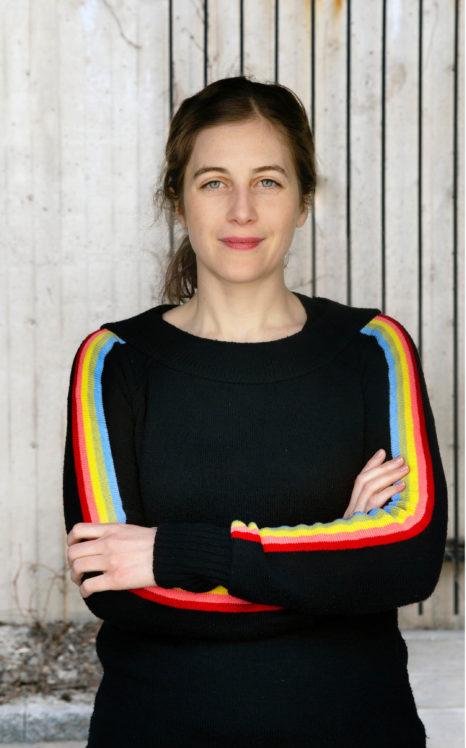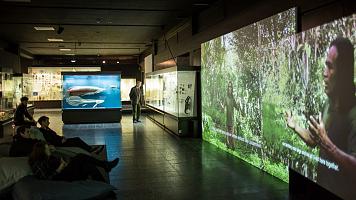MA
Research Architecture
Content navigation menu
Why study MA Research Architecture at Goldsmiths
The MA Research Architecture is for graduates from a range of disciplines who want to examine how architecture can engage with questions of contemporary culture, politics, media, ecology and justice, and question whether spatial practice can become a form of research.
- You’ll join a group of students and practitioners from a wide range of backgrounds, experiences, and disciplines, and have the opportunity to work collaboratively and benefit from peer-to-peer learning under the guidance of a tutor.
- You’ll combine studio work with theoretical research in either the Research Architecture (RA) or Forensic Architecture (FA) studio stream of the MA.
- Lectures, seminars, and workshops will equip you with grounding in critical spatial practices and related areas of inquiry.
- There are several workshops on the programme. These day-long participatory events are led by invited guest speakers with specific expertise in the field.
- In general, Research Architecture students develop their own approach and conceptual frameworks, whereas Forensic Architecture students tend to work more directly with the methods developed by the Agency. If you are interested in investigating a condition then the RA studio might be more appropriate, whereas if you wish to research a specific incident or singular event then the FA studio is a good choice.
- For those who choose the Forensic Architecture studio you will be able to work with the Forensic Architecture team through a placement.
- Graduates of the MA will be well-suited for doctoral research or able to pursue a career in the areas of architecture, design, journalism, law, filmmaking, art and curating to name a few.
Contact the department
If you have specific questions about the degree, contact Christina Varvia or Dr Susan Schuppli.
Length
1 year full-time or 2 years part-time
Fees
Home - full-time: £10350
Home - part-time: £5175
International - full-time: £19520
Department
What you'll study
You'll take the following compulsory modules:
| Module title | Credits |
|---|---|
| Research Studio | 60 credits |
| Critical Conditions | 45 credits |
| MA Symposium | 15 credits |
| Dissertation | 60 credits |
Two of these are taught modules: Research Studio (which includes the Research Architecture or Forensic Architecture studio streams), and the theoretical module Critical Conditions.
You'll also carry out an oral presentation in the form of the Symposium, and you'll complete a Dissertation project.
In addition, you will have the option of participating in an unassessed placement with the Forensic Architecture Agency. You'll benefit from guest lectures, workshops, and field trips to local archives and exhibitions.
You'll have the opportunity to learn technical skills (video, animation, sound, Geographic Information Science [GIS], 3D modelling, mapping, photogrammetry, technical drawing, and basic coding) at an appropriate level as part of an extensive series of workshops that run over the course of each year. (Attendance in these workshops is not mandatory and competencies with these digital tools are not assessed.)
In addition, you are encouraged to attend the non-assessed Visual Cultures Public Programme that takes place on Thursday evenings and may attend other occasional, optional workshops offered by the School or Goldsmiths, which focus on specific themes and problems in the broad field of visual cultures and spatial politics and beyond.
How you'll be assessed
Visual Cultures assessments are 100% coursework. Normally this consists of essays, sometimes accompanied by creative projects, group projects, multi-media projects, presentations, symposia, reviews, and studio work.
Entry requirements
Places on the MA Research Architecture are very competitive. They are not limited to graduates of architecture, but open to a range of other disciplines. You should have, or expect to gain, an undergraduate degree of at least second class standard.
Portfolio
A good portfolio of practical and/or scholarly work, as well as experience in conducting research and a demonstrable interest in critical spatial practices, are essential. Your portfolio should be uploaded with your application.
International qualifications
We accept a wide range of international qualifications. Find out more about the qualifications we accept from around the world.
If English isn’t your first language, you will need an IELTS score (or equivalent English language qualification) of 6.5 with a 6.5 in writing and no element lower than 6.0 to study this programme. If you need assistance with your English language, we offer a range of courses that can help prepare you for postgraduate study.
Fees and funding
Annual tuition fees
These are the PG fees for students starting their programme in the 2024/2025 academic year.
- Home - full-time: £10350
- Home - part-time: £5175
- International - full-time: £19520
If your fees are not listed here, please check our postgraduate fees guidance or contact the Fees Office, who can also advise you about how to pay your fees.
It’s not currently possible for international students to study part-time under a student visa. If you think you might be eligible to study part-time while being on another visa type, please contact our Admissions Team for more information.
If you are looking to pay your fees please see our guide to making a payment.
Funding opportunities
Each year, 2022-27, Forensic Architecture will offer a full-time MA scholarship that covers tuition plus a monthly stipend for a home or international student. Please note your interest in this scholarship in your application. Find out more on the Centre for Research Architecture web pages.
Explore the Goldsmiths scholarships finder to find out what other funding you may be eligible for.
If you are a UK student you may be eligible for a postgraduate loan.
Meanwhile our Careers Service can also offer advice on finding work during your studies.
Paying your fees
Find out about paying your tuition fees.
Additional costs
In addition to your tuition fees, you'll be responsible for any additional costs associated with your course, such as buying stationery and paying for photocopying. You can find out more about what you need to budget for on our study costs page.
There may also be specific additional costs associated with your programme. This can include things like paying for field trips or specialist materials for your assignments. Please check the programme specification for more information.
How to apply
You apply directly to Goldsmiths using our online application system.
To complete your application, you will need to have:
- Details of your academic qualifications
- The email address of your referee who we can request a reference from, or alternatively a copy of your academic reference
- Copies of your educational transcripts or certificates
- A personal statement
- A portfolio (see the entry requirements section for more information)
You'll be able to save your progress at any point and return to your application by logging in using your username/email and password.
When to apply
We accept applications from October for students wanting to start the following September.
We encourage you to complete your application as early as possible, even if you haven't finished your current programme of study. It's very common to be offered a place that is conditional on you achieving a particular qualification.
Late applications will only be considered if there are spaces available.
If you're applying for funding, you may be subject to an earlier application deadline.
Selection process
Admission to many programmes is by interview, unless you live outside the UK. Occasionally, we'll make candidates an offer of a place on the basis of their application and qualifications alone.
Further guidance
Read our guide to applying for a postgraduate degree at Goldsmiths.







